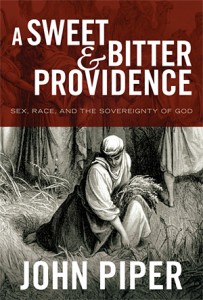 Yesterday’s Bible reading was the book of Ruth in my plan I’m working through with CrossPoint. I’ve been familiar with the book for quite some time. But 2 resources that I discovered in the past couple of years really improved my understanding and perspective on the book.
Yesterday’s Bible reading was the book of Ruth in my plan I’m working through with CrossPoint. I’ve been familiar with the book for quite some time. But 2 resources that I discovered in the past couple of years really improved my understanding and perspective on the book.
First of all, John Piper’s book A Sweet and Bitter Providence is one of the best out there on the subject.
The book of Ruth aims to show that all of history, even its darkest hours, serves to magnify the glory of God’s grace. In surprising ways, a thousand years before Christ, this book glorifies his saving work on the cross, as we will see. Ruth is about the work of God in the darkest of times to prepare the world for the glories of Jesus Christ. (p. 16)
Piper does a fantastic job of unveiling the Christocentricity of Ruth throughout the book. Many times, we read an Old Testament book and come away without realizing the ties to Christ’s redemptive work on the Cross that the book contains. Piper does not make this mistake.
The story of Ruth, at one level, is about God’s sweet and bitter providences. He governs the famine, and the marriage of Naomi’s sons to foreign women, and the death of her sons, and the faithfulness of Ruth, and the availability and nobility of Boaz, and the birth of a child to preserve the line of Elimelech. The story shows that God is at work in the darkest of times for the good of his people. The life of believers is not a straight path to glory, but they do get there.
But at another level, the story is about something much larger than one family and their sorrows and joys. It is about God’s plan to glorify his grace in the Son of David, the Messiah, the Redeemer, Jesus Christ. Ruth and Naomi and Boaz are caught up in something of eternal significance. Glory is not too big a word for the destinies implicit in this story.
The application of this glory to us may be felt most personally when we focus on Ruth herself. How are we included? All the calamities of this story seem to be designed to get a Moabitess into the genealogy of Jesus. Ruth is one of the four women mentioned in Matthew’s genealogy (Matthew 1:5). God pursued her. He turned the world upside down, you might say, to include Ruth in the lineage of his Son.
Surely this is significant for us. Does it not mean that God’s blessings are free and undeserved? Ruth was an idolatrous Moabitess before God pursued her (1:15). She did not merit this pursuit. It was free. That is the way God pursues you and me. “You did not choose me, but I chose you” (John 15:16).
Not only that, but God moved the world in order to include a foreigner in the lineage of the Messiah. Ruth was not a Jew. Is not God showing us that his heart is for the nations—all the nations? The glory of Christ is that he comes from the nations and dies for the nations. His blood was shed for the nations, and the nations’ blood ran in his veins. The Jewish high priest prophesied better than he knew in John 11:51–52 “that Jesus would die for the nation, and not for the nation only, but also to gather into one the children of God who are scattered abroad.” “You were slain, and by your blood you ransomed people for God from every tribe and language and people and nation” (Revelation 5:9).
The redeeming work of Christ is free and undeserved. It is intended for every ethnic group on the planet. All ethnocentric and racist impulses are crucified in Christ. That too is what the story of Ruth is about. (p. 111-113)
You can pick up the book from Amazon here.
The other resource is a sermon series David Platt preached on the book of Ruth back in 2009. I’m guessing he leaned heavily on Piper’s book, and it is a great listen. You can find it here.
